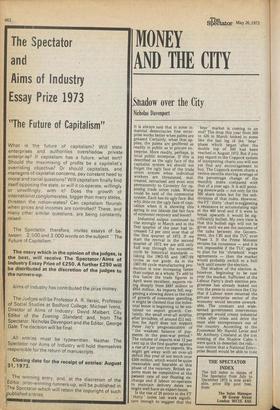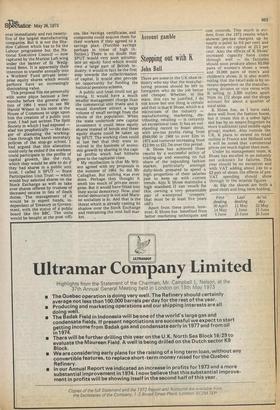MONEY AND THE CITY
,Snadow over the City
Nicholas Davenport
It is always said that in some industrial democracies free enterprise works better when palms are greased. Certainly, when that applies, the palms are proffered as readily in public as in private enterprise. More readily, perhaps, in local public enterprise. If this is described as the ugly face of the capitalist system we should not forget the ugly face of the trade union system when individual workers are threatened, maltreated, ostracised and even sent permanently to Coventry for opposing trade union rules. Worse could be said of the communist system. Each has its ugly face. But why dote on the ugly face of capitalism when it is showing this spring in our islands the fair face of economic recovery and boom?
Industrial output continued to rise strongly in March and in the first quarter of the year had increased 7.2 per cent over that of the first quarter of 1972. If we start the revival in the second quarter of 1972 we are still only half way through the economic cycle by historical standards — taking the 1963/65 and 1967/69 cycles as our guide. As in the 1967/69 cycle manufacturing production is now increasing faster than output as a whole. To add to this lustre the trade figures in April were excellent, exports rising sharply from £887 million to £954 million. As imports fell, suggesting a slowing down in the rate of growth of consumer spending, it might be claimed that the industrial boom is beginning to be sustained on export growth. Certainly, the small over-all surplus, after invisibles, of around £11 million for April does not support Peter Jay's prognostication of "the weakest balance of payments in the post-war period." The volume of exports was 12 per cent up in the first quarter against a rise of 9 per cent for imports. We might get away with an over-all deficit this year of not much over £500 million, which would be quite reasonable and bearable at this phase of the recovery. British exports must be competitive at the piesent rate of our floating exchange and if labour co-operates to maintain delivery dates we might well have an export boom.
Is the rise of 25 points in the FT ' thirty ' index last week significant enough to suggest that the bear' market is coming to an end? The drop this year from 509 to 426 in March looked to some like the last leg of the ' bear ' phase which began ' after the double top of 540 had been reached in August 1972. But if you pay regard to the Coppock system of interpreting charts you will not yet find any encouragement to buy. The Coppock system charts a twelve-months moving average of the percentage change of the monthly index compared with that of a year ago. It is still pointing downwards — not only for the 500 share index but for the subdivisions of that index. However, the FT ' thirty ' chart is suggesting a resistance or accumulating sign at the 460 level and if it were to break upwards it would be significantly bullish. My own view is that this bullish sign will not be given until we see the outcome of the talks between the Government, the CBI and the TUC over Phase 3. If the Prime Minister secures his consensus — and it is not impossible if the TUC agrees to plan for his ' threshold ' wage agreements — then the market would probably switch to a bull tack until nearer the election.
The shadow of the election is, however, beginning to be cast over the market. Sufficient of the Labour Party's draft election programme has already leaked out into the press to convince the City that if Labour were returned the private enterprise sector of the economy would become unworkable. The constant and widespread .government intervention proposed would create industrial crisis after crisis and drive the most able entrepreneurs out of the country. According to the Economist Mr Harold Lever and Mr Anthony Crosland at the last meeting of the Shadow Cabin t were quick to demolish the ridio.bus notion that a National Enterprise Board would be able to take
over immediately and run twentyfive of the largest manufacturing companies. But it is not the Shadow Cabinet which has to fix the Labour programme but the National Executive Council — now captured by the Marxist Left wing under the banner of St Wedgwood Benn. It is apparently their Intention to transfer annually into a Workers' Fund private enterprise equity shares which would perforce have an increasingly diminishing value. This proposal fills me personally with some pique because a few months before the general election of 1964 I went to see Mr Harold Wilson in his room at the House of Commons to urge upon him the creation of a public unit trust. I had just written The Split Society in which I had exposed — alas! too prophetically — the danger of alienating the working class through the harsh monetary policies of the stop-go school. I had argued that this alienation could only be ended if the workers could participate in the profits of capital growth, like the rich, which they would be able to do if they had shares in a public unit trust. I called it SPUT — State Participation Unit Trust — which would buy selected shares on the Stock Exchange as well as take over shares offered by trustees of deceased estates in lieu of death duties. The management of it would be in expert hands, in dependent of Treasury or Government, with the status of a public board like the BBC. The units would be bought at the post offi ces, like savings certificates, and companies could acquire them for their workers if they agreed to a savings plan. (Forcible savings perhaps in times of high inflation.) There is no doubt that SPUT would very soon accumulate an equity fund which would own a large part of British industry; it would in fact be the first step towards the collectivisation of capital. It would also provide an opportunity for funding the national pensions scheme.
A public unit trust could not go wrong. It would have a much smaller management charge than the commercial unit trusts and it would therefore attract a large volume of small savings from the whole of the population. When the state undertook new capital investment it could issue equity shares instead of bonds and these equity shares could be taken up by SPUT. The working class could at last feel that they were involved in the business of economic growth by sharing in the capital profits which had hitherto gone to the capitalist class. My recollection is that Mr Wilson agreed with my proposals in the summer of 1964. So did Mr Callaghan. But nothing was ever done. Perhaps they thought it smelt too much of private enterprise. But it would have fitted into their social democracy. Now, alas!
social democracy is out and Marxist socialism is in. And that is the threat which is already casting its shadow over the Stock Exchange and restraining the next bull market.



































 Previous page
Previous page